#fatherlessness
Text
The idea that a father does not have an attachment to his child, a fundamental intense, profound relationship with his child, is very difficult to swallow. And we now know that obviously this is not true.
But the attachment relationships a child builds with its mother and father are different. They are just as intense and just as profound and just as influential. But they are different.
So, when we look at a mum's attachment relationship is very much based on nurture and it's quite an exclusive relationship, so it's very much between the two, between the mother and child, and they're very much turned in on each other. So, it's an inward looking relationship, okay? And it's all about that security, that nurturing security.
When we look at dads, that is also based on nurture. So there's very much a nurturing element there. But there is an additional element and this is really critical to the dad's role. Because as well as nurture, there is an element of what we call challenge. So rather than it being an exclusive relationship, inward looking, what we see with fathers is they go, I love you, I nurture you, I am your secure foundation, but now what I'm going to do is I'm going to turn you around and go, there's the world, and you need to learn how to deal with it.
--
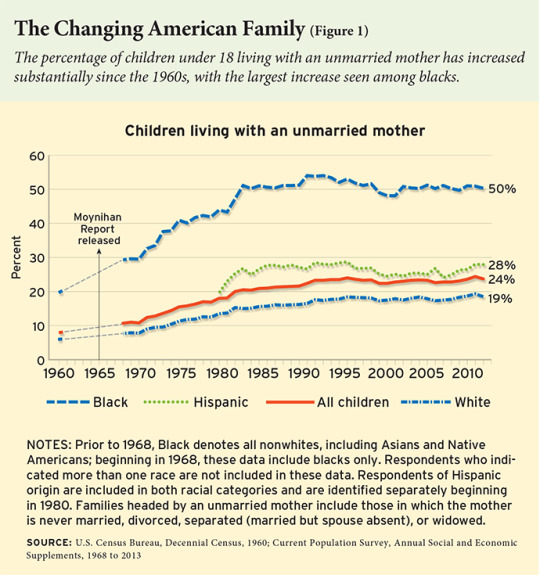
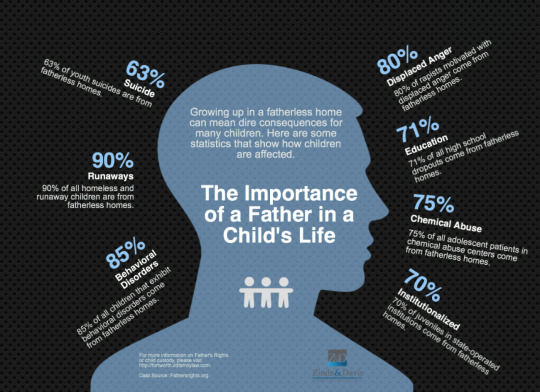
"The most reliable predictor for gang activity and youth violence is neither social class nor race or education but fatherlessness."
-- John Sowers
"It is no exaggeration to say that fatherlessness is the most harmful demographic trend of this generation. It is the engine driving our most urgent social problems".
-- David Blankenhorn
#parenthood#fatherhood#motherhood#fatherlessness#fathers#mothers#psychology#human psychology#religion is a mental illness
9 notes
·
View notes
Text
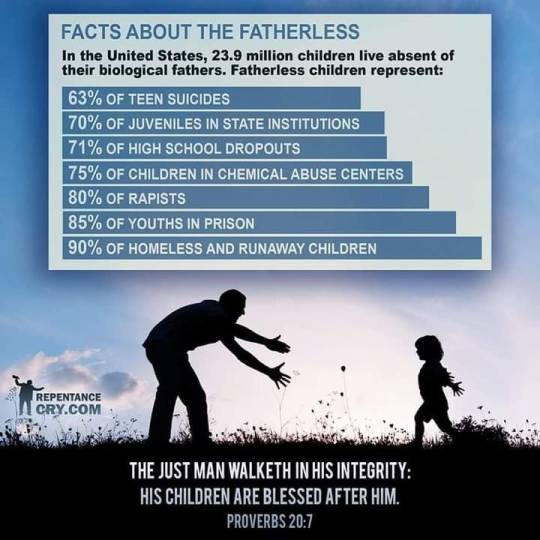
5 notes
·
View notes
Text
Mass shootings are mostly caused by the fatherlessness crisis, and the solution is to incentivize marriage, abolish no-fault divorce, enact compulsory child support to be paid by non-custodial parents, and punish child abandonment the same way we punish child murder.
#fatherlessness crisis#fatherlessness#The US has one of the highest rates of single parenthood in the world#marriage#no-fault divorce#abolish no-fault divorce#child support#child abandonment#school shootings#mass shootings
5 notes
·
View notes
Text
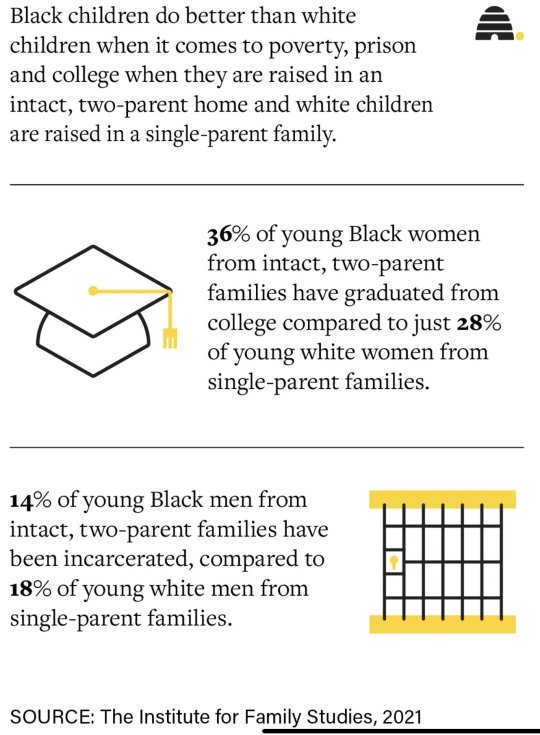
0 notes
Text
If Larry Elder’s recent interview on "The Breakfast Club" podcast were a campaign ad, the title would practically write itself: “Never bring talking points to a fact fight.”
For more than an hour, the veteran radio host and 2024 presidential candidate used data and logic to pick apart every argument Charlamagne, DJ Envy, and political commentator Tezlyn Figaro had to offer about the state of black America.
The interview started with Elder discussing fatherlessness, something he described as the top social problem in America today. He noted that non-marital births have increased threefold for both blacks and whites since the 1960s and linked the breakdown of the nuclear family to violent crime, poverty, and incarceration.
You would think that after hearing something like that, a man who talks so much about race and helping “his people” would want to know what he and other influential African-Americans can do to change this reality. Instead, the host responded by asking Elder, “What do white people do wrong?”
In that moment, Charlamagne went from being a noted expert on systemic racism and social justice to a staunch supporter of the White Lives Matter movement. Like many black progressives, the author and radio host loves to talk about race when it comes to police brutality, “mass incarceration,” redlining, school funding inequities, or acts of violence tied to white supremacy. But as soon as the conversation turns to the roles black people must play in our own uplift, suddenly his throat starts to close, his skin starts to itch, and the only color he can see is white.
This allergic reaction to accountability can flare up at a moment’s notice. The only thing that brings a person suffering from severe symptoms out of anaphylactic shock is a jab of the “what about white people?” EpiPen. The urgent concern for white people magically disappears as the other symptoms subside and the patient is able to resume predictable conversations about systemic racism.
No family, community, or country can improve its social and economic condition as long as its members see themselves as helpless and powerless.
Politics is a contact sport, so ideas and positions that are never tested get brittle over time. The mind starts to atrophy when you spend most of your time with people who nod approvingly whenever they hear their favorite political catchphrase.
Black voters, like all Americans, deserve insightful debates on important issues. We are not being served by the outlets that sell systemic racism and white supremacy as our main problems, only to claim that bigger government and better white people are our main vehicles for change.
𝐇𝐨𝐩𝐞𝐟𝐮𝐥𝐥𝐲, 𝐋𝐚𝐫𝐫𝐲 𝐄𝐥𝐝𝐞𝐫’𝐬 𝐞𝐧𝐭𝐢𝐫𝐞 𝐢𝐧𝐭𝐞𝐫𝐯𝐢𝐞𝐰 𝐬𝐞𝐫𝐯𝐞𝐬 𝐚𝐬 𝐚 𝐰𝐚𝐤𝐞-𝐮𝐩 𝐜𝐚𝐥𝐥 𝐟𝐨𝐫 𝐚𝐧𝐲𝐨𝐧𝐞 𝐰𝐡𝐨 𝐭𝐡𝐢𝐧𝐤𝐬 𝐠𝐞𝐭𝐭𝐢𝐧𝐠 𝐚 𝐃𝐞𝐦𝐨𝐜𝐫𝐚𝐭 𝐢𝐧 𝐭𝐡𝐞 𝐖𝐡𝐢𝐭𝐞 𝐇𝐨𝐮𝐬𝐞 𝐢𝐬 𝐦𝐨𝐫𝐞 𝐢𝐦𝐩𝐨𝐫𝐭𝐚𝐧𝐭 𝐟𝐨𝐫 𝐭𝐡𝐞 𝐟𝐮𝐭𝐮𝐫𝐞 𝐨𝐟 𝐭𝐡𝐢𝐬 𝐜𝐨𝐮𝐧𝐭𝐫𝐲 𝐭𝐡𝐚𝐧 𝐚 𝐝𝐞𝐝𝐢𝐜𝐚𝐭𝐞𝐝 𝐝𝐚𝐝 𝐢𝐧 𝐡𝐢𝐬 𝐨𝐰𝐧 𝐡𝐨𝐮𝐬𝐞.
—
DeLano Squires
#real talk#real issues#fatherlessness#charlamagne tha god#dj envy#larry elder#Delano squires#society#african american#black community#rise up#enough of the bullshit#no more trying to fix white people#black conservatives#speak truth#don’t fall for the carrot sticks#grievance politics#victim mentality#mental prisons#racism of low expectations#self sabotage#character and values are more important than blind loyalty to identities#for my peeps#at least try#say no to demoralizing narratives#the real white supremacy#soul killers#stop fucking around#the breakfast club#podcasts
0 notes
Photo
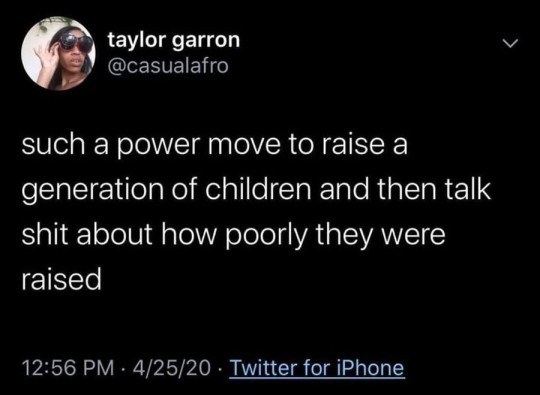
That's feminism for ya!
1 note
·
View note
Text
On Racism
“The problem is not systemic white racism; the problem is generational black fathers absenteeism.” - Allison Cox
0 notes
Text
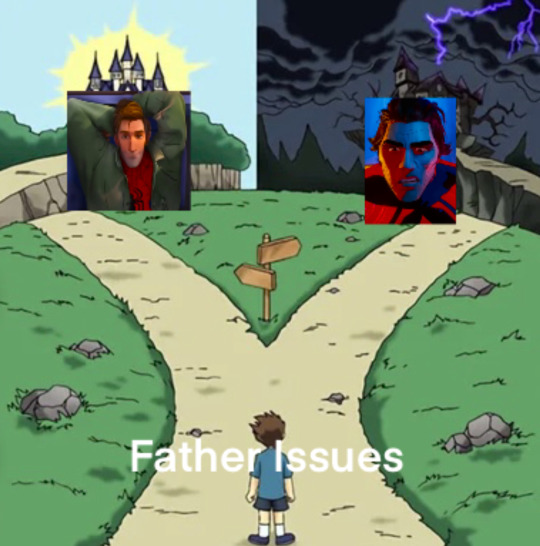
Speaking my honest truth here
#across the spiderverse#spiderman#miguel o’hara#peter b parker#atsv#miguel o’hara x reader#peter b parker x reader#I KNOW YA’LL HAVE D*DDY ISSUES#I SEE WHAT YOU SAY I SEE WHAT YOU DO#being fatherless will lead you down this path but it’s your choice to pick which road you go down
7K notes
·
View notes
Text
Fatherless America- Outstanding book for fathers and about fathers
0 notes
Text
Daddy Issues - He's a Good, Good Father - Bishop Kevin Foreman
#atlanta#bishop#christian#church#colorado#daddy#day#denver#fatherlessness#father’s#foreman#georgia#harvest#inspiration#issues#kevin#message#prayer#series#sermon
0 notes
Text


By: Joseph Burgo, Ph.D.
Published: Jan 17, 2024
As my thoughts began to coalesce around the subject of this essay–adolescents in history rebelling against their parents–memories of an old movie from my childhood kept coming to mind. Even readers who haven’t seen it have probably heard the name–Gidget, a low-budget California beach movie starring Sandra Dee, James Darren and Cliff Robertson. It was released in 1959 and spawned two film sequels, two TV series, and several made-for-television movies. In early December of last year, I tracked down the original Gidget on YouTube and watched it again–some 50 years after I’d first seen it.
The title character’s obsession with surfing, and her transformation from tomboy to infatuated teenager and finally to wise young woman don’t concern me here. It’s the subplot focusing on two other characters that resonates with my subject matter. Kahuna, a man somewhere in his late 20s or early 30s, lives in a shack at the edge of a surfing beach. After serving as a pilot during the Korean War, he has decided to drop out of society and live as a bum, following the sun and traveling the world in search of waves. His only true companion is a parrot named Flyboy, although the gang of teenage surfer boys who hang around him that summer look up to Kahuna as their leader.
One of those surfers, nicknamed Moondoggie, is home for the summer after his freshman year at college; he has resolved to drop out instead of returning to campus in the fall, team up with his hero Kahuna, and pursue the life of a beach bum. Both men have rejected the rules-driven adult world. Neither wants the responsibility that comes with adulthood, viewing it as a kind of prison. In a gesture of defiance, Moondoggie tears up the allowance check he has received from his father and vows to go it alone.
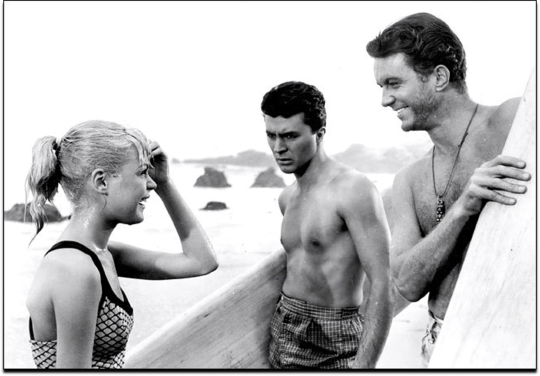
[ Sandra Dee as Gidget (left), James Darren as Moondoggie (middle), and Cliff Robertson as The (Big) Kahuna (right) ]
In 1959 when this film was released, Western Civilization was on the verge of major social upheaval as youth culture began challenging long-standing social norms about sexuality, marriage, and family. But there on the cusp of this revolution, Gidget’s world seems confident that the generation of young people coming of age will eventually submit to the values of their parents. At the outset, Moondoggie and Kahuna are both adolescents rejecting the authority of the existing social order; but in the end, they embrace it. Kahuna gets a job as a pilot. Before returning to college, Moondoggie gives Gidget his pin, a promise of future marriage and a new generation of children to come.
Adolescents rebelling against the authority embodied in an existing social order and eventually becoming reconciled to it—this is a story we’ve been telling for generations.
By identifying as “trans” in today’s youth culture, adolescent rebellion has found a new way to express itself. I don’t want to be simplistic about the society-wide dynamics here. There are other obvious factors involved: a permissive social order in which it’s hard to find any behavior extreme enough to count as true rebellion, for example, and a social media landscape that makes teens feel insecure, insignificant, and desperate to prove they’re unique. But here I want to talk about the way a rebellion against authority can fuel trans-identification in our children.
My 16-year-old client Sophia, for example, had given her parents no trouble as a younger girl. For most of her childhood, she’d been a respectful daughter and a good student. Because her family had moved around quite a bit due to her father’s shifting business, she hadn’t made close friends and rarely socialized outside the family. Her mother had always taken an active interest in Sophia’s schoolwork and athletics. And then one day, Sophia announced that she was trans, told them she wanted to be called Finn, and insisted that her parents use he/him pronouns.
I’ve had other female clients with a nearly identical background, and I’ve heard similar stories from other parents who’ve consulted me about their trans-identified teens. The announcement often comes out of the blue following a mostly non-conflictual childhood, causing a lot of angst and opening a rift between child and parents. Nothing the parents say–no evidence they bring or logic they apply–makes any difference. The child rejects it all from a place of absolute certainty. “I know I’m trans,” they’ll say. “I’ve always known it.”
These children have often been a bit different from the other kids, struggling to fit in. Maybe they were highly gifted or on the autism spectrum. They might just have been “quirky” and beloved for it by their parents. But especially during the teen years, the need to belong to one’s peer group overrides almost everything else; and as American teens have done for generations, these quirky kids reject the values of their parents for new ones held by other kids their own age, especially as they pertain to sex and gender.
Back in the 1970s, Goth became the dominant form of youth rebellion. The Goth scene rejected traditional sexual mores while celebrating new and occasionally deviant forms of sexuality. There are obvious similarities between that movement and today’s transgenderism. Dr. Az Hakeem, a British psychiatrist with extensive experience treating gender distress, has actually referred to Trans as “Goth 2.0.”

The main difference between the two is obvious, however: teens and young adults immersed in Goth might have pierced or tattooed their limbs, but they didn’t have healthy body parts removed by surgeons. They no doubt consumed illicit drugs, but not off-label anti-cancer medications and cross-sex hormones that may leave them sterile. Once they grew out of Goth, young adults were probably left with a few embarrassing tattoos or piercings but no other visible scars, unlike detransitioners today who may be scarred for life.
Contempt for parents often plays a role in youth rebellion, be it mild or toxic. Back in Gidget’s day, the kids were hip while the adults holding onto their old-fashioned ways were square and not at all with it. Today, moms and dads who quaintly cling to the duality of biological sex are clueless about the multiplicity of possible genders; if they refuse to affirm their child’s new identity, insisting it’s impossible to change from one sex to another, they’re deemed transphobic and therefore unworthy of respect. Most of the trans-identified teens I see in my practice feel and express utter contempt for their mothers and fathers. Two of them will turn 18 within the next six months; they both regard their parents with scorn and intend to have no further contact after coming of legal age.
Behind the contempt, I sense a lot of terror about impending adulthood. The teens in my practice look forward to their medicalized transition as if it will be a major accomplishment, more significant than anything else they’ll ever do, but they have little understanding about how to lead a responsible adult life. I often say to my young clients that transition is not an achievement: they still have to figure out what career they’d like to pursue, and how to make enough money to support the lifestyle they want. One of these clients poo-poos the very idea of earning money and insists she’ll live in a camper van, free from responsibility. Another imagines devoting her life to collecting vintage motorcycles, believing that about $30K per year is all she’ll need. None of them ever imagines having children or building a family, much less planning ahead for retirement. They have a narrow vision of their own future that seems to go no further than attaining the freedom to start taking cross-sex hormones.
In this sense they remind me of Kahuna and Moondoggie, those two characters from Gidget in flight from the responsibilities of adulthood. While my clients apparently look forward to escaping their parents’ control and attaining the legal right to make their own choices, they don’t really want the responsibilities that go along with such freedom. On some level, they see transition as an escape from the dreaded reality of adulthood, a triumph over the tedious world of facts, financial obligations, and inevitable limits.
There’s another classic film you might know, The Graduate, directed by the brilliant Mike Nichols. Benjamin Braddock, the main character, spends most of the movie rebelling against the limitations and responsibilities imposed by the real world, the world of his stodgy parents; at the end, after he has relentlessly pursued young Elaine and disrupted her more-or-less forced marriage to another man, the two run off, she still in her wedding gown, and escape on board a city bus. The final shot shows realization slowly dawning upon them, their facial expressions collapsing from elation into dread.
Now what are we going to do?
At the close of The Graduate, Benjamin and Elaine realize that however fun and even exciting it might be to rebel against their parents, at the end of the day, they’ve achieved nothing beyond wrecking their families; in the aftermath, they’ll have to pick up the pieces and make a life for themselves in the real world. You can’t outrun reality, of course. It will always prevail in the end. In a softer way, you see Moondoggie and Kahuna coming to this realization at the end of Gidget.
For millennia, parental authority has been the primary means of transmitting a culture’s values: parents teach their children to abide by standards embodied in their culture, and the world-at-large has almost always supported the parents in exercising that role … at least until now. Honor thy father and thy mother says the Fifth Commandment; today, children learn that if Mom and Dad won’t affirm their new identity and use the designated pronouns, they should cut off those parents and embrace a new glitter family online. In California, a state court deprived Adam Vena of visitation rights because he wouldn’t affirm his four-year-old son’s new gender identity. The modern world often undermines parental authority when it takes a stand against gender ideology.
By severing ties between parent and child, a cult does the same thing; it appropriates parental authority onto itself as a way to bind members more tightly to the group. The votaries of gender ideology likewise subvert parents, replacing their guidance with cultish dogma. A great many influential forces today promote this dogma, from primary education to medical boards to professional associations–a society-wide rebellion against parental authority and, I would add, against the ultimate authority that is reality.
Every parent I’ve consulted with has felt helpless in the face of this phenomenon. Based on their love and better knowledge of their own children, they believe they know what’s best for those kids but feel unable to wield authority as parents to guide them. In my own case, when I insisted there were obvious psychological reasons why my daughter might have wanted to become a boy, I was treated with contempt by the medical establishment and colleagues in my profession. Meanwhile, all around my daughter, every influential voice in her world told her that I, her father, was wrong.
But I also believe that we, as parents, bear some responsibility for the erosion of our own authority. Many mothers and fathers today seem uncomfortable with the very idea of parental authority, preferring to be buddies with their kids rather than authority figures. Maybe we don’t want to be viewed as square or stodgy, droning on about antiquated notions like taking personal responsibility and showing respect for your elders. I remember the slight feeling of shock and discomfort I felt upon first hearing myself say the words “because I said so!” to my own kids. Why should I have felt so uneasy when exerting myself as the adult in charge and expecting my children to mind me?
Writing for The Atlantic, the psychologist Joshua Coleman says that family ties have shifted over the last century from a focus on duty and obligation to one promoting personal growth and the pursuit of fulfillment. He quotes the historian Stephanie Coontz, who says: “For most of history, family relationships were based on mutual obligations rather than on mutual understanding. Parents or children might reproach the other for failing to honor/acknowledge their duty, but the idea that a relative could be faulted for failing to honor/acknowledge one’s ‘identity’ would have been incomprehensible.” In our youth-driven culture, words like duty, obligation and authority sound almost quaint. Today there seems to be no valid authority outside of one’s personal “lived experience.”
What’s to be done? How are we as parents to regain authority and prevent our children from permanently damaging their bodies when a cultish ideology encourages them to do so? This is the question every parent of a trans-identified child would like to ask, I imagine, and I wish I had a simple answer. The longer I work in this field, the more I feel that gender ideology must be questioned in every area where it dominates; only if we loosen gender ideology’s stranglehold on our cultural institutions can we hope to return parental authority to its rightful place. Get involved in the pushback–that’s my advice to parents. Run for your school board, get to know your local politicians, challenge this new orthodoxy wherever you see it. Don’t play the pronoun game.
I’d also like to say something in particular about fathers. As a father myself, I’m concerned with specifically paternal sources of authority: What is the role of fathers in helping our families to navigate this crisis? Does paternal authority differ in any important ways from maternal authority? And where are all the fathers, anyway? I’ve had a few joint consultations with both parents of a trans-identified child but it’s invariably the wife who does the talking. More often, I have consultations with the mothers alone. I sometimes wonder whether empathic, nurturing mothers are so desperate to maintain contact with their children that they won’t or can’t draw a firmer line. Perhaps the fathers, by deferring to their wife’s lead, have failed to mount a more vigorous defense of reality.
Could that be a paternal function? I honestly don’t know. I think of Chris Elston–better known as Billboard Chris–who addressed himself to Rachel Levine on Twitter, saying that puberty blockers and cross-sex hormones would be normalized for children “over my dead body.” Is that an implicit threat of violence? As fathers, do we need to take a more aggressive stance?
I’m prepared to be told that I’m just projecting here, or possibly overgeneralizing. Questions about my exercise of paternal authority within my own family–or my failure to exercise it properly–are on my mind a lot these days. With the modern world the way it is, it sometimes seems as if there’s nothing that even an authoritative and loving father can do. I often feel helpless and without any real power, an ineffectual if well-intentioned dad.
Which brings me back to Gidget. We’re all familiar with the bumbling father motif in television and commercials today–the clueless man set right by his clever wife and children. Al Bundy, Homer Simpson, Ray Barone. I used to think this was a more recent phenomenon but there it was in a movie from 1959. Gidget’s dad seems constantly baffled by his daughter’s behavior, issuing hasty pronouncements that are promptly undermined or ignored by his wife and child. He wears an expression of near constant bewilderment. It’s up to the two women in his world to set him on the right path.
I dug a little deeper and learned that father figures from 1950s sitcoms like “Make Room for Daddy,” “My Little Margie,” and “Life with Father” typically tended to be hapless buffoons. As a culture, we’ve been ridiculing the very notion of paternal authority for decades. Even the series title for “Father Knows Best” was originally intended to have a question mark at the end, to make it ironic and thereby underscore the well-known reality that mothers were the real heads of households. My friend the historian Peter Filene tells me that this belittling of fathers goes even further back–to the 1920s when comic strips began depicting men as shorter than their wives.
Then there’s the classic teen rebellion movie Rebel Without a Cause from 1955, with James Dean playing the main character Jim Stark. Jim’s father, overshadowed by his domineering wife, is a weak man unable to wield any kind of authority. In one famous scene, Jim comes upon his dad kneeling on the upstairs landing of their home wearing a frilly apron. Dad has dropped a dinner tray he prepared for “mom” and is cleaning up after himself, obviously fearful that his wife will discover the mess he’s made. Jim clearly wants and needs his father to stand tall and stop humiliating himself.
This might sound like I’m blaming women for usurping authority from their husbands by belittling them, but that’s not what I believe. I think it’s a society-wide problem where, for more than a century now, the force of paternal authority has been undermined through ridicule and mockery. In recent years, our ongoing critique of the “patriarchy” often makes it seem as if all sources of power and authority exercised by men are inevitably bad.
In Totem and Taboo written back in 1913, Freud opined that fathers embody the symbolic order of society, law, and external reality; they set boundaries, establish rules, and help their children to navigate the external world by introducing principles of discipline and order. A lot has changed in the last hundred or so years, and even to my ears, Freud’s view sounds quaint and out of date. Besides, how can you maintain rules and boundaries when the external world will only encourage your children to violate them?
But still, I cling to the belief that there’s an important and distinctive role for fathers to play in fighting this gender madness, even if I can’t yet define it. If you’re a father who’d like to discuss this issue, I invite you to reach out, in confidence and at no charge.
==
Here's the interesting thing. You can only rebel and exist at the margins if the margins actually exist.
When everyone is special, no one is special.
Queer Theory is self-contradictory.
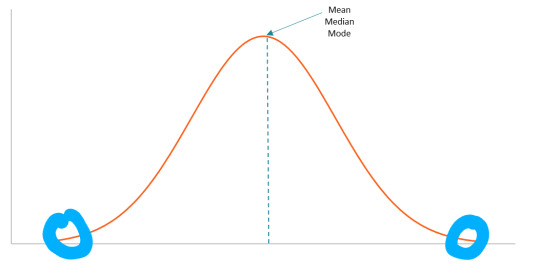
#Joseph Burgo#Goth 2.0#goth#gender ideology#queer theory#fatherlessness#gender identity#rebellion#religion is a mental illness
15 notes
·
View notes
Text
astarion saying “this is why your father doesn’t love you ❤️” whenever durge does something considerate/romantic. aaand send tweet
#durge: hey i got you that jacket u were looking at in figaro’s#astarion: fatherless behavior ❤️#this is eventually going in something i write. astarion as bhaals most beloathed son in law#stopping by withers in camp like ‘hi grandpapa’ with big infuriating bats of his eyelashes#bg3#astarion#durge#astarion x durge#niko plays bg3
572 notes
·
View notes
Text

From the notes of Capt. Alfred Jones:
"Davie was a bus and the 'Flying Fortress' moniker seemed to pass her by, but it was a ship with a brave crew. The trudge of getting back to England from enemy territory is a story for another day. I miss her and sometimes I miss the boys we lost that day."
-✪- -✪- -✪-
B-17F "Dear Davie":
*U.S. Army Model B-17F-65-BO
Air Corps Serial No. 42-29670
Delivered Cheyenne 31/1/43; Pueblo 18/2/43; Salina 15/2/43; Brookley 19/3/43; Smoky Hill 23/3/43; Dow Field 18/4/43.
Assigned to the 333rd Bomb Squadron/94th Bomb Group [TS-L] "DEAR DAVIE" 22/4/43; Missing in Action near Hamburg 25/7/43 with Alfred "Comet" Jones, **Co-Pilot: Daryl "Speed" Reed, Navigator: Richard Reed, Bombardier: Charlie Marstaller; Radio Operator: Johnathan Graves, Flight Engineer/Top Turret Gunner: Clyde "Pepsi" Ray, Ball Turret Gunner: William Ortlieb, Waist Gunner: Leslie Lipsey, Waist Gunner: Paul Rapoport, Tail Gunner: Thomas Pugh (6 Killed in Action); "DEAR DAVIE" lost to flak/anti-aircraft fire, crashing near Uetersen, 15 miles NW of Hamburg, Germany.
-✪- -✪- -✪-
[nerd things & acknowledgements below cut]
Notes on the B-17F...
The B-17F was an upgrade of the previous E model, with several notable changes: A one- or two-piece plexiglas nose cone, as opposed to the ten-paneled cone of previous versions. Reinforced landing gear allowed for a greater maximum payload, from 4,200 lb (1,900 kg) of ordnance to 8,000 lb (3,600 kg). Flight and combat range of the F model was improved by 900 mi (1,400 km) with the addition of nine self-sealing rubber fuel cells in the wing root, aka, "Tokyo tanks". The F model was generally characterized by being tail-heavy - which lead to part failure - and woefully undefended from the front; the early F models had no front-facing armament, leaving a 60° blind spot to the direct front of the aircraft - a flaw which was exploited by German pilots, who held air superiority. Later F models would see a list of possible available modifications (factory and field) such as inserting two .50 caliber machine guns into the nose cone to solve the blind spot. Other modifications to later F models were bulged cheek turrets, as opposed to the window-mounted guns of earlier iterations, and the available addition of the iconic "Bendix" chin turret. The chin turret is far more common on the subsequent G "gunship" variant. ("Dear Davie" is an early F model without the nose mount, bulged cheeks, or chin turret.)
*This model production block, serial no., and fate are borrowed from real-life B-17F #42-29670, "Thundermug." "Thundermug" was an aircraft that originally served in the 333rd Bomb Squadron/94th Bomb Group alongside my great-grandfather and his usual steed, "The Gremlins Hotel." It was transferred to the 544th BS/384th BG, at which point it went Missing in Action over Hamburg from flak/aa-fire; 8 of its crew became POWs while 2 were KIA. I have had the honor to speak to descendants of both of its crews and help them research "Thundermug"; I wish to voice a mere glimpse of their stories in a unique way.
**All names of Alfred's crew are either cobbled-together family names throughout our history here or entirely fictitious - though some were inspired by real people whom I grew up with stories of. All inspirations were individuals that lived good lives post-war.
#alpha romeo tango#gremlin's things with wings#alfred f. jones // daring to fly#hetalia#historical hetalia#hetalia headcanons#aph america#hws america#alfred f jones#hey guys crucify me if you must#i'm really proud of this drawing#but i also understand it's pretty nerdy and the headcanon does deal with something a little tragic#but i'm hurling this to tumblr motherless and fatherless for your judgment#this took a few hours haha#love you guys for real#i really love bombers guys sorry for being autistic on main
1K notes
·
View notes
Text
𓆩🖤𓆪 Screw Your Bike! 𓆩🖤𓆪
❥ prompt: You hated to admit it but, you were jealous of a damn motorcycle. How was it possible to feel second place to a vrooming object with two-wheels? What did it have that you didn't? A leather seat and a holo-graphic chrome wrap, really? Well, if Kayn wanted to take a ride, he'd have to go through you. Literally and figuratively.
❥ content/warnings: nsfw 18+, dom!kayn, dirty talk, bratty behavior, profanity
❥ characters/pairings: Heartsteel!kayn x f!reader

You were going to be in so much trouble. Good. That's where you wanted to be. After being blown off recently, you weren't trying to be nice. If Kayn wanted to keep having fun with his new toy, then he'd have to go through you.
"Where the hell are my keys?" He growled out loud. Frustration igniting that irresistible scowl across his features. "I swear, if Ezreal thought It'd be funny to hide them, then it's going to be funnier when I murder him."
Oh. Poor Ezreal. You hated if he ever took the blame for your misdeed. But your secret wouldn't be kept for long. It was only a matter of time before you were found it. Which, you wanted to be. Very badly.
Kayn asked for your help in looking for the missing keys. You played your part well; sifting through cluttered drawers and couch cushions. After searching the house, it was time to search around the garage.
"Probably left it in the ignition or something," Kayn mumbled to himself, scanning the body of his motorcycle.
You stood a few feet away. Smiling. Watching him wrack his brain about where exactly were those damned keys. It was time to be found out. You bounced on your toes. Jingle Jingle.
That definitely caught someone's attention. Kayn looked up, narrowing his green eye against you. "Did you just...jingle?"
"I don't know. Did I?" You posed with fake innocence. You bounced again. Jingle Jingle. "Mm, maybe I did. I can't really tell. Would you mind finding out for me?”
Kayn’s look spat fire, but his smirk crossed with intrigue. He sauntered over with a sway, and sucked against his teeth. “Clever hiding spot. But kinda uninspiring, don’t you think?”
You merely shrugged. Allowing him to bask in whatever verbal triumph he wanted to display. You had to keep your cool. Especially when he plunged a hand between your cleavage. You held in a shudder. The rough of his knuckles brushed against your nipples during his careless search.
That all-too confident smirk faltered at the ends. But where his ended, your grin began. Nothing was there.
"You were right. That spot was uninspiring." You shook your lower half. Jingle Jingle. "Wonder where else they could be."
Kayn's jaw tightened. You saw the clench of teeth. He didn't liked to be fooled with. The fire that blazed just behind his eyes told you the punishment he wanted to reign. All according to plan.
"You're a damned brat." He said with a bite, tempting to snake a hand up your black mini-skirt.
He almost barked when you gripped his wrist, pinning his hand against your inner thigh. You narrowed your mascaraed lashes against him. "And you're an ass-head. Think I'd be happy with you blowing me off over your supped-up tricycle?"
Kayn glanced from his motorcycle back to you. So, this is what this was all about. You wanted to pick a fight with him over his new toy. Fine, have it your way—but it wasn't going to be the verbal kind. Words were all pointless, meaningless, a waste of time. Fucking things out always worked better.
Kayn slammed his mouth down on yours. You yelped, gripping his wrist tighter. You wouldn't relent, not so easily. When he sucked and nipped at your lower lip, you wrapped your free hand around his neck, grasping for some semblance of control.
Kayn groaned from the slight pressure and claimed your mouth fully. He returned that pressure by gripping tighter against your thigh fat. You were going to let his hand go. Unless you wanted bruises. He wasn't afraid to leave a mark or two on your body. Actually, he preferred it. A reminder of him anytime you undressed.
You whined a moan. The digging of his fingers sending shocks between your legs. You gasped for air, your strength siphoned.
Kayn breathed a shit-winning smirk into your ear. You bit your bottom lip. He thrusted his fingers inside your panty line. Sliding the keys out, the metal jostled and glided against your folds. Wet slicked and coated.
"You're going to pay for almost tarnishing the metal. I don't think you know exactly how much I'd have to cough up to replace them. Nothing you could afford with cash, anyway." Kayn's features darkened, licking the keys clean of your taste.
Oh God. He was such a dick. This is exactly what you wanted. "You're such an ass—"
You cried out when frim hands smacked against your back side, gripping the now tender flesh. Yanking you off your feet, Kayn practically tossed you onto his motorcycle. With your back pressed against the control panel, Kayn settled between your straddled legs. He was going to fuck on you his motorcycle to make a point? Before you could protest, Kayn possessed your lips with a snarl and bite. Goose-bumps rose when you heard the undoing of his jean button and the down slide of his zipper.
"I hope I ruin the leather on this stupid thing," you said, gripping his hot dick in your hand.
Kayn growled and shoved your mini-skirt up to your stomach, snapping your panties to the side. "Ruin it and you're going to be licking your mess off the seat, while I fuck you from behind."
Shit. That sounded so hot. "Screw your fucking bike," you said with a shudder. His fingers swiped against your pussy. Completely drenched for him.
"Don't tempt me with the idea." Kayn took himself from you in his hand, circling your clit with the head of his cock. Slicking it up and down. You writhed, legs shaking against his sides.
Kayn shifted his hips. With his glazed tip, he dragged the length of his cock through your entrance. Your throbbing folds parted, spreading around his shaft. Pushing up to your cervix, he dragged up and back, coating himself with your fluids.
Your hands snatched his shoulders, finding your nails leaving desperate trails for him to take you, over and over and over again. Pleading for him to never stop.
Kayn bent forward, gripping the motorcyle handles. He dipped his head, pressing his teeth against the helix of your ear. "Think you're more exciting than my bike? Then you better purr louder." Bastard!
Kayn slammed inside of you, delivering all of his frustration, hunger and revenge. Taking you like the demon that he inevitably was. You cried out, tightening your legs around him, holding him closer. As if he was your savior and not your actual reaper.
Fuck. You were so hot, tight, and wet. Your walls pulsed and squeezed, making him swell and throb. Kayn gritted his teeth. He almost let himself reach his threshold before you—he was never going to let you fucking win.
Kayn lapped a long tongue across your neck, before diving and sinking a pair of canines into your skin. An apparent mark of his victory. You whole body jolted with pleasure. Your pussy clamped down so hard around his shaft, for a moment, Kayn's vision went black.
You screamed his name. Bucked against him. Coming all around him. Kayn went with you, catching his vulgar groans in his throat as he filled up your insides.
You got exactly what you wanted. Kayne think's he's won, and that's fine. But you were the real winner. He rode you before the damn bike. You smiled to yourself. All according to plan.
#heartsteel#heartsteel x reader#kayn x reader#reader insert#sheida kayn#league of legends#LoL#this is like only my second time writing smut#sorry if its not the best#need to practice so that's what im gonna do haha#ever since i saw the motocycle sex had to happen on it#pls dont judge my fatherless behavior
670 notes
·
View notes
Text
Rules of Misogyny in action:
1, 11, 14, 16
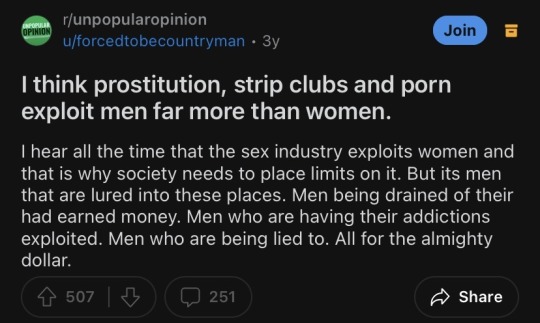

I would even argue maybe 3 and 7 a little bit as well.
Women are kept in cages, starved, beaten, molested, and raped, but that’s just not as bad as men exploiting other men’s perversion and objectification of women!
#rules of misogyny#misogyny#radical feminsm#radblr#radfem safe#radfem#radfems do interact#antiprostitution#anti sex industry#sex work is rape#all johns are bastards#males are scum#moid behavior#fatherless behavior#scrote behavior
347 notes
·
View notes

